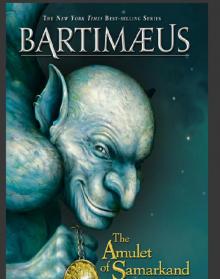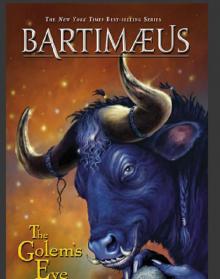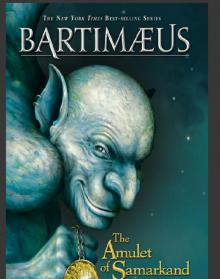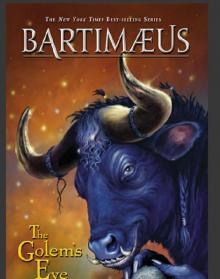- Home
- Jonathan Stroud
The Ring of Solomon Page 9
The Ring of Solomon Read online
Page 9
‘I’ve found a mark,’ he said.
The beggar scowled. ‘Toss a coin first, then tell. Got to keep up appearances, haven’t we?’ He waited till the newcomer obliged. ‘So, spit it out,’ he said. ‘What is he?’
‘Not a “he”; a “she”,’ replied the thin man sourly. ‘Girl came in from the south this morning. Travelling alone. Wants to go to Jerusalem. She’s off haggling with the camel traders now.’
‘Got much, you think?’ the beggar said, squinting up from the corner where he sat. He waved his stick angrily. ‘Move away from the sun, curse you! I’m lame, not blind.’
‘Not so lame either, from what I hear,’ the thin man said, stepping a few paces to the side. ‘Her clothes are nice enough, and she’s got a sack with her that warrants a look too. But she’d fetch a good price herself, if you get my meaning.’
‘And she’s on her own?’ The beggar stared off along the street; he scratched the stubble of his chin. ‘Well, the caravans don’t leave until tomorrow, that’s a given, so she’ll stay in town tonight whether she wants to or not. There’s no hurry, is there? Go and find Intef. If he’s drunk, knock some sense into him. I’ll go to the square, keep watch, see what’s going on.’ The beggar rocked back and forwards twice and, by leaning on his stick, stood up with sudden swift agility. ‘Well, get off,’ he said savagely. ‘You’ll find me in the square. Or, if she moves, wherever you hear my call.’
He swung his stick and, with a series of limping jerks, set off along the road. Long after he was out of sight, his cries for alms could still be heard.
‘I could sell you a camel, girl,’ the merchant said, ‘but it would be unusual practice. Send your father or your brother; I will drink tea with them and chew khat and make such arrangements as are meant to be made between men. And I will berate them politely for allowing you out alone. The streets here are not kind to girls, as they ought to know.’
It was late afternoon, and the peach-and-orange light refracting through the fabric of the tent struck lazily upon the carpet and the cushions, and upon the merchant who sat amongst them. A pile of clay tablets, some old and hard, others still soft and only partially covered by the merchant’s marks, rested at his side. Laid out carefully in front of him was a stylus, a tablet, a cup and a jug of wine. A dangling djinn-guard hung from the roof above his head, twirling gently to the movements of the air.
Asmira looked back at the closed flap of the tent. Business in the square was ebbing. One or two shadows moved swiftly past. None of them was familiar to her: none dawdled, head down, staring at its feet … Still, evening was coming; it would not do to be out alone much longer. Far off she heard a beggar’s whining call.
She said: ‘You will make the arrangements with me.’
The merchant’s broad face did not alter. He looked down at his tablet, and his hand strayed to the stylus. ‘I’m busy, girl. Send your father.’
Asmira gathered herself, forced her fury down. This was the third such meeting she had had that afternoon and the shadows were growing long. She had twelve days before the attack on Marib, and the camel ride to Jerusalem would take ten. ‘Sir,’ she said, ‘I have ample payment. You need only speak your price.’
The merchant compressed his lips; after a moment he set down the stylus. ‘Show me this payment.’
‘How much do you need?’
‘Girl, I am expecting the gold traders in from Egypt in the next few days. They too will seek transport to Jerusalem and will buy as many camels as I can provide. From them I will get little pouches of gold dust, or perhaps small nuggets from the Nubian mines, so that my moustaches will curl with excitement and I will close up my tent for a month and make merry in the Street of Sighs. What can you show me in the next five seconds that will make me give up one of my fine, dark-eyed camels to you?’
The girl reached inside her riding cloak; when her hand reappeared, it had something the size of an apricot stone glittering in the palm.
‘It is a blue diamond from the Hadhramaut,’ she said. ‘Shaped and sanded into fifty facets. They say the Queen of Sheba wears one similar on her headdress. Provide me with a camel and it’s yours.’
The merchant sat very still; peach-and-orange light moved upon the surface of his face. He looked towards the closed tent flap, from where the sound of the marketplace was muffled. The tip of his tongue ran between his lips. He said, ‘A man might wonder whether you had more such things …’
Asmira moved so that the front of her riding cloak fell open; she rested her fingers on the dagger hanging loosely at her belt.
‘… but to me,’ the merchant continued heartily, ‘such payment is more than adequate! We can make immediate arrangements!’
Asmira nodded. ‘I’m so glad. Give me my camel.’
‘She is going down Spice Street now,’ the thin man reported. ‘She’s left the beast at the square. They’re equipping it for tomorrow. Not sparing any expense either. A canopy and everything. She’s got money in that bag of hers.’ As he spoke, he played with a long strip of cloth, twisting it between his hands.
‘Spice Street’s too busy,’ the beggar said.
‘Ink Street?’
‘Good enough. Four of us should manage it.’
It was true what Asmira had told the bread-seller. She was not a magician. But that did not mean she was innocent of magic.
When she was nine years old, the senior guard-mother found her as she was practising in the yard. ‘Asmira, come with me.’
They went to a quiet room above the training hall, where Asmira had never been. Inside were tables and cabinets of ancient cedar wood, their half-open doors revealing stacks of papyrus scrolls, clay tablets and pottery shards notched with signs. On the centre of the floor two circles had been drawn, each containing a five-pointed star.
Asmira frowned and pulled a lock of hair back from her face. ‘What’s all this?’
The senior guard-mother was forty-eight years old and had once been First Guard of the queen. She had put down three tribal insurrections in the Hadhramaut. She had a thin white sword-scar slashed across her wrinkled neck and another across her forehead, and was regarded with awe and veneration by the sisterhood. Even the queen herself was said to speak to her with some humility. She looked down at the scowling girl and said mildly, ‘They tell me your training is going well.’
Asmira was looking at a papyrus scroll laid out on the table. It was covered with an ornate and densely written script – except in the middle, where a sinister figure, half smoke, half skeleton, had been sketched with a few deft strokes. She shrugged.
The guard-mother said: ‘I have seen you with the knives. I could not throw as well as you when I was your age. And nor could your mother.’
The girl did not look at her, nor change expression, but her bony little shoulders stiffened. She spoke as if she had not heard. ‘What’s all this magical stuff, anyway?’
‘What do you think it is?’
‘Ways of summoning demons of the air. I thought it was forbidden. Only priestesses are allowed to do it, the guard-mothers say.’ Her eyes blazed. ‘Or were you all lying?’
In three years the senior guard-mother had had cause to beat the girl innumerable times for truancy, disobedience and cheek. Now she only said, ‘Asmira, listen. I have two things to offer you. The one is knowledge, the other is this …’ She held out her hand. Between the fingers hung a silver necklace; on its end, a pendant shaped like the sun. When the girl saw it, she gave a little gasp.
‘I do not need to tell you that it was your mother’s,’ the senior guard-mother said. ‘No, you may not have it yet. Listen to me now.’ She waited till the girl had raised her face: taut, hostile, tamping its emotion down. She said: ‘We did not lie to you. Magic is forbidden to everyone in Sheba but the priestesses of the temple. Only they may summon demons in the ordinary way. And it is right that this is so! Demons are wicked, deceitful things, dangerous to all. Think how volatile the hill-tribes are! If every chieftain could raise a
djinni whenever he argued with his neighbours, there would be a dozen wars a year, and half the population dead! But in the hands of the priestesses, djinn can be put to better purpose – how do you think the reservoir here in Marib was built, or the walls of the city, for that matter? Each year they help repair the towers, and dredge the water channels too.’
Asmira said, ‘I know this. They do the queen’s work, just as the men must labour in the fields.’
The senior guard-mother chuckled. ‘This is so. Djinn are in fact much like men – provided you treat them sternly, and do not give them an inch of room to work you ill, they have several worthwhile uses. But here is the thing. Magic is useful to the guards also, and for one good reason. Our duty, the whole purpose of our being, is to protect our sovereign. We rely on our bodily skills for the most part, but sometimes that alone is not sufficient. If a demon attacked the queen—’
‘A silver blade would deal with it,’ the girl said shortly.
‘Sometimes, but not always. A guard needs other defences too. There are certain words, Asmira, certain magical Wards and incantations, which can temporarily rebuff a lesser demon’s power.’ The senior guard-mother lifted the necklace so that the sun pendant swung slowly, catching the light. ‘Spirits hate silver, just as you say, and charms like this give force to the uttered spell. I can teach you such things, if you wish. But to do so, we will have to summon demons to practise on.’ She gestured around at the cluttered room. ‘This is why we have special dispensation to learn such techniques here.’
‘I’m not afraid of demons,’ the girl said.
‘Asmira, summoning spirits is perilous, and we are not magicians. We learn basic incantations, so that we may test our Wards. If we are hasty, or careless, we will pay a dreadful price. Lesser guards do not need to understand these skills and I will not force you to do so either. If you wish, you can leave this room now and never return.’
The girl was gazing at the little twirling sun. Its light flashed in her eyes like fire. ‘My mother knew these skills?’
‘She did.’
Asmira held out her hand. ‘Teach me, then. I will learn.’
As she walked back to the inn where she was to spend the night, Asmira stared up between the darkened buildings at the glittering expanse of stars. As she watched, a light streaked in the heavens, flared briefly and went out. A shooting star? Or one of Solomon’s demons spreading terror to other lands?
Her jaw clenched; her nails dug into her palms. It was another ten days before she would reach Jerusalem – and that was without the sandstorms that might delay the caravan. Ten days! And in twelve the Ring would be turned and devastation brought upon Sheba! She closed her eyes and took a long breath in and out, as she had been taught to do when emotions threatened. Her training worked; she felt herself grow calm.
When she opened her eyes, there was a man standing in the road in front of her.
He held a long strip of cloth between his hands.
Asmira halted, looking at him.
‘Softly,’ the man said. ‘No struggling.’ When he smiled, his teeth were very white.
Asmira heard footfall on the road behind; glancing over her shoulder, she saw three other men hastening close, one of them a cripple, a crutch wedged under his arm. She saw the ropes, the sack held ready, the knives tucked neatly in their waist-bands, the glints of moisture in their smiling eyes and mouths. On the cripple’s shoulder, a small black impling crouched, flexing its dirty yellow claws.
Her hand moved towards her belt.
‘Softly,’ the man with the cloth said again. ‘Or I’ll hurt you.’ He took another step, then sighed, fell backwards. Starlight glinted on the dagger blade protruding from the centre of his eye.
Before he hit the ground, Asmira had swivelled, ducked beneath a clutching hand and pulled the knife from the waist-band of the nearest man behind her. Dancing aside from the stumbling assault of the third, who sought to loop a coil of wire about her head, she killed both men with rapid blows and turned to face the fourth.
The cripple had halted a few yards distant, his face slack with blank surprise. Now he gave a long, low snarl and snapped his fingers. The impling beat its wings and launched itself at Asmira with a cry. Asmira waited till it was close, then touched her silver necklace, spoke a Ward of force. The impling exploded in a ball of flame that spiralled away and burst against a wall in a shower of angry sparks.
Before the fires faded, the cripple was away along the street, stick tapping frantically upon the stone.
Asmira let the soiled knife fall to the ground. She turned and walked back to her bag, crouched, loosened its ties and removed a second silver dagger. Flipping it in her fingers, she looked back along the road.
The beggar was a long way off now, head down, rags flying, lolloping and bounding, swinging himself forward with great sweeps of his stick. In a few more steps he would be at a corner and out of sight.
Asmira took careful aim.
Shortly after dawn the following day, those emerging from their houses on the corner of Ink and Spice Streets made a gruesome discovery: four bodies sitting neatly against a wall, their seven legs stretched out side by side into the road. Each man had been a well-known slaver and vagrant of the district; each had been killed with a single strike.
At roughly the same moment, a camel train of thirty riders set out from Eilat’s central square on the long journey to Jerusalem. Asmira was among them.
11
I blame Beyzer for the incident. It was his turn keeping watch, but his spot in the cypress was a tad too comfy, what with the noonday heat and the smell of resin and the nice plump implet he was using as a cushion. Dozing gently, Beyzer didn’t notice Solomon’s approach. This took some doing, partly because the king was pretty tall, and partly because he was accompanied by seven magicians, nine court officials, eleven slaves, thirty-three warriors, and a robust percentage of his seven hundred wives. The rustling of their robes alone made a noise like a storm-lashed forest, and since on top of this you had the officials shouting at the slaves, the slaves waving their palm leaves, the warriors rattling their swords and the wives squabbling continuously in a dozen languages, Solomon and his entourage were hard to miss. So even without Beyzer, the rest of the temple workforce managed to stop in time.
Which just left me.
Thing was, I was at the end of the line; I was the one hefting each half-ton block out of the quarry, chucking it into the air, catching it by a corner on an outstretched finger, spinning it stylishly and then punting it on to Tivoc, who was waiting by the temple. Tivoc would then pass the block on to Nimshik, Faquarl, Chosroes or one of the other djinn who were hovering around the uncompleted walls in a variety of outlandish guises.1 After that: a quick toss into position, a hasty aligning spell, and Solomon’s temple was a block nearer completion. Took about thirty-five seconds, quarry to wall-top. Lovely. A work-rate any employer would be chuffed with.
Except Solomon, that is. No. He didn’t want it done like that.2
You’ll notice that conditions at the building site had altered markedly since the first few days. Back then, with Khaba and Gezeri close at hand, we’d been doing everything painstakingly, while keeping human form. But then things changed. Perhaps reassured by our compliance, and with the temple now progressing well, the magician stopped visiting the site so often. Shortly afterwards Gezeri departed too. To begin with, through fear of the flail, we remained on our best behaviour. On the second day, still left to our own devices, our resolve wavered. We took a swift vote amongst ourselves and, by a majority of six to two,3 approved a change of work practices with immediate effect.
We promptly set up our lookout and spent our time in a mixture of loafing, gambling, imp-tossing and philosophical debate. Occasionally, when we needed the exercise, we’d whip a few stones magically into position, just to make it look like we’d been doing something. It was a definite improvement in our daily grind.
Unfortunately, it was during one of these br
ief spasms of activity that Solomon – having never chosen to visit us before – decided to drop by. And it was thanks to Beyzer that I didn’t get the alarm.
Everyone else was fine, thank you very much. As the royal entourage came clanking, jabbering and mincing to a halt, my fellow workers were safely back in human form, standing about meekly carving things with their chisels as if butter wouldn’t melt in their smug little mouths.
And me?
Me, I was still the pygmy hippo in a skirt,4 singing lusty songs about Solomon’s private life and tossing a giant stone back and forth through the air as I climbed out of the quarry at the edge of the site.
Immersed in my ditty, I didn’t notice anything amiss. As usual, I flexed a warty arm and tossed the stone.
As usual, it sailed across in the sweetest of arcs to the corner of the temple where Tivoc stood.
Or in this case didn’t stand, since he’d long since bowed and scraped and made shuffling way for Solomon to inspect the porch. And with Solomon had come his magicians, court officials, warriors, slaves and wives, each crowding close to bathe in the royal presence.
They heard my singing. They craned their heads round. They saw the half-ton stone being lobbed towards them in the sweetest of arcs. They had time for maybe the briefest of lamentations before it squished them flat.
The hippo in a skirt slapped its hand over its eyes.
But Solomon just touched the Ring on his finger that was the source and secret of his power. The planes trembled. And from the earth jumped four winged marids in emerald flame, who caught and held the stone, one at each corner, a few inches from the great king’s head.5
Solomon touched the Ring again, and from the earth sprang nineteen afrits, who caught the exact same number of his wives mid-swoon.6
Then Solomon touched the Ring a third time, and from the earth leaped a posse of sturdy imps, who caught the hippo in the skirt as it was quietly slipping away into the recesses of the quarry, bound it hand and foot with thorny bonds, and dragged it back through the dirt to where the great king stood, tapping his sandalled foot and looking rather tetchy.

 The Leap
The Leap Buried Fire
Buried Fire Heroes of the Valley
Heroes of the Valley The Empty Grave
The Empty Grave The Hollow Boy
The Hollow Boy The Last Siege
The Last Siege The Dagger in the Desk
The Dagger in the Desk The Amulet of Samarkand
The Amulet of Samarkand The Golem's Eye
The Golem's Eye The Screaming Staircase
The Screaming Staircase The Outlaws Scarlett and Browne
The Outlaws Scarlett and Browne The Ring of Solomon: A Bartimaeus Novel
The Ring of Solomon: A Bartimaeus Novel Lockwood & Co
Lockwood & Co Lockwood & Co: The Screaming Staircase
Lockwood & Co: The Screaming Staircase Bartimaeus: The Amulet of Samarkand
Bartimaeus: The Amulet of Samarkand The Amulet of Samarkand tbt-1
The Amulet of Samarkand tbt-1 Lockwood & Co.: The Creeping Shadow
Lockwood & Co.: The Creeping Shadow The Ring of Solomon
The Ring of Solomon Lockwood & Co. Book Three: The Hollow Boy
Lockwood & Co. Book Three: The Hollow Boy Bartimaeus: The Golem’s Eye
Bartimaeus: The Golem’s Eye